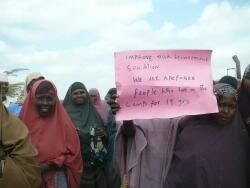Kenya Urged to Honor Somali Refugee Pledge
 WASHINGTON, Jun 12 (OneWorld.net) – Aid groups are calling on Kenya to fulfill promises of more land and funding for Somali refugees living in camps on the country’s border, now the largest concentration of refugees in the world.
WASHINGTON, Jun 12 (OneWorld.net) – Aid groups are calling on Kenya to fulfill promises of more land and funding for Somali refugees living in camps on the country’s border, now the largest concentration of refugees in the world.
What’s the Story?
“The refugee crisis worsens with every day of delay,” said Gerry Simpson, refugee researcher for Human Rights Watch (HRW). “Continued paralysis and unresponsiveness [by the Kenyan government] puts the well-being of all the refugees — new and old — at grave risk.”
Kenyan Prime Minister Raila Odinga stated in February of this year that the state would provide land to three burgeoning refugee camps struggling to provide adequate services for uprooted Somalis.
As civilians flee the ongoing conflict in Somalia, many have no choice but to seek shelter in already overcrowded camps near Dadaab in northeastern Kenya. Up to 275,000 refugees are living in camps built for 90,000.
Due to the constant influx of refugees, conditions are declining in the overwhelmed camps. Besides limited land and shelter, there is little access to clean water, sanitation, or proper health care.
HRW is also calling on international donors to increase financial support for the refugee camps. So far, $32 million — only one-third of the amount needed by the United Nations (UN) refugee agency to accommodate more people — has been given to support humanitarian operations in the camps.
“Donors should take all possible steps to encourage the Kenyan authorities to provide more land, and should then do all they can to finance the rapid building of new camps,” said Simpson. (Read the full story from HRW below.)
Local Somali Officials Ask for Help
Officials in Eil Waq, a small Somali town on the border with Kenya, have also asked for help from the international community. Thousands of refugees, unable to cross into the neighboring country, are in desperate need of food, water, and shelter, according to local leaders.
The town, with a population of about 24,000, is struggling to meet those needs. At least 15,000 Somali refugees are either setting up makeshift shelters or being hosted by families in Eil Waq, reports the humanitarian news service IRIN.
“I am hosting four other families,” said Hussein Hassan Katilow, the district commissioner. “There is not a single 24-hour period when we don’t get people coming.”
Meanwhile, local journalist Mahad Mohamed noted many refugees had been planning to cross into Kenya but were denied entry. Kenyan officials maintain the border is not closed, but Mohamed said he witnessed a number of people turned back by authorities during the past two weeks.
Surge in Violence, Refugees
A recent spike in fighting in and around Somalia’s capital Mogadishu has spurred a surge in the number of people fleeing the war-torn country. Since May 7, the violence has displaced almost 120,000 people, many of whom have fled to neighboring Kenya.
However, those unable to leave the Somali capital may face an even more dire situation. Mogadishu has once again become a combat zone for government troops and a number of armed opposition groups, trapping many residents in their homes and blocking their access to humanitarian aid, reports IRIN.
“There are people who have been stuck in their homes for the last three weeks; they are terrified, hungry, and have no access to any help,” said Asha Sha’ur, a civil society activist. “People may be dying in their homes and we don’t know about it.”
Prompted by Somalia’s escalating conflict and the outpouring of refugees, the top UN representative for the Horn of Africa called for a new approach.
“Billions of dollars have been spent for or in that country over the past 10 years. Still we have a crisis,” said Ahmedou Ould-Abdallah. “We have to stop that never ending task with a lasting peace solution.”
Government institutions, the army, and the police force should be rebuilt, continued Ould-Abdallah, adding that “impunity must be addressed and human rights violators, including those who kill and kidnap journalists and aid workers, condemned.”
Background: Conflict and Humanitarian Crisis in Somalia
Somalia is at the top of Foreign Policy magazine’s 2008 Failed States Index, an annual report by the think tank. The absence of a strong central government since the 1991 overthrow of the military regime has resulted in violence and lawlessness.
Many Somalis have been driven out of the country by an ongoing civil war between Islamist insurgents and the western-backed government, which fears that Somalia will become an Islamic state. Repeated incursions by Ethiopian troops seeking to wipe out the insurgents have also fanned the flames of conflict.
In 2008, a series of UN-sponsored talks in Djibouti among opposition parties led to the signing of a peace agreement.
The accord, among other things, called for the cessation of all armed confrontation by the two sides within 30 days. But the recent outbreak of violence in Mogadishu on May 8 between government and opposition forces has stalled the country’s forward momentum and is hampering humanitarian aid, according to updates from news agencies and aid groups.Â
“They [refugees] had returned to Mogadishu after the signing of the UN-backed peace agreements in Djibouti in January, only to be sent running for their lives again,” said a UN report.
Thousands of civilians have lost their lives to the conflict and a total of 1.1 million people in Somalia are currently living as refugees in their own country.
For more information on politics, conflict, and development in Somalia, see OneWorld.net’s Somalia country guide.
Comments
comments
 Calendar
Calendar






































